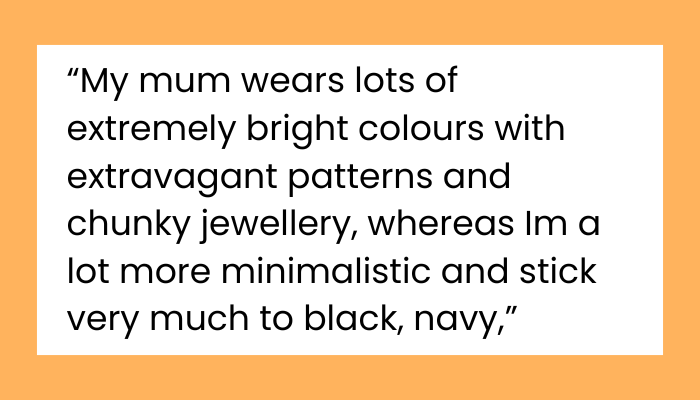Flashy-Loving Mom Freaks Out When Her Minimalist Daughter Admits She Hates Every Gift
OP (26F) has for years received gifts from her mother that feel completely out of sync with her personality and tastes. While OP is minimalist, neutral-toned, and dislikes wool and sequins, her mother gives bold, bright, awkward clothing and décor — clothes she’d never wear, bedding she’d never use, colors she’d never pick. The mismatch is so consistent and glaring that OP began to wonder if her mother even really “knows” her.
On her birthday, the mother gifted a baby blue frilly wool jumper, a bright pink fluffy clutch, and a lime green sequin tee. OP got upset. She asked her mother if she even knew her at all. The mother responded by calling OP ungrateful and stormed off. So now OP wonders: “Am I the asshole (AITA) for calling her out?”
It’s always awkward to receive a gift that’s completely not your vibe without being a jerk and pointing out what a miss it is

While many of us experience this from time to time, today’s author does it occasionally





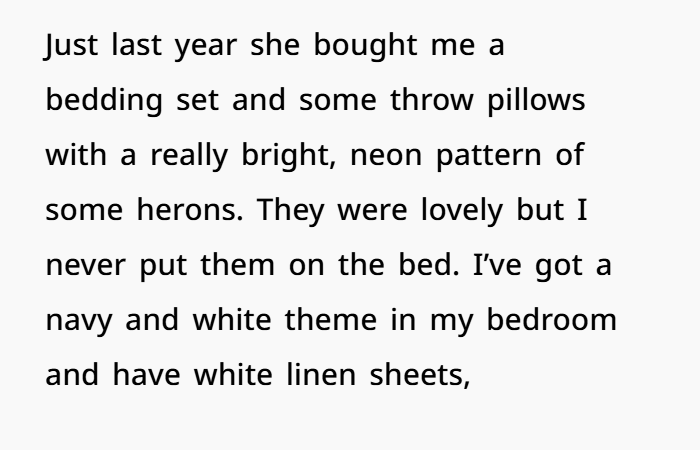
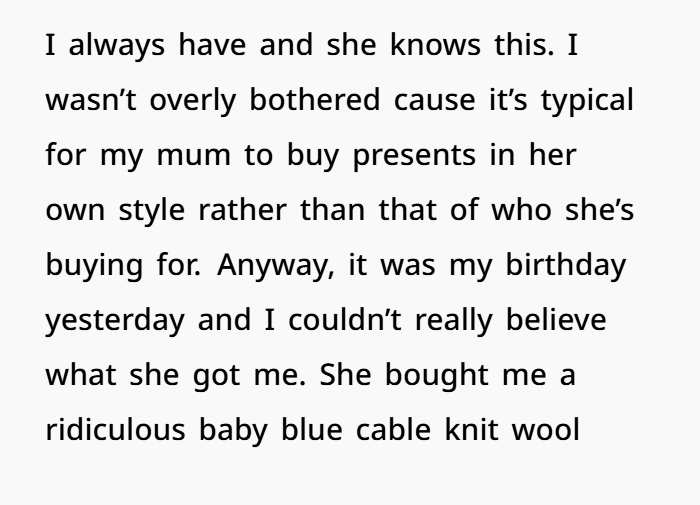


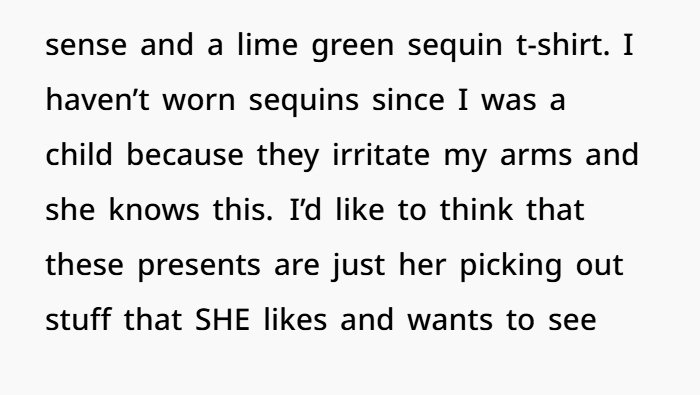

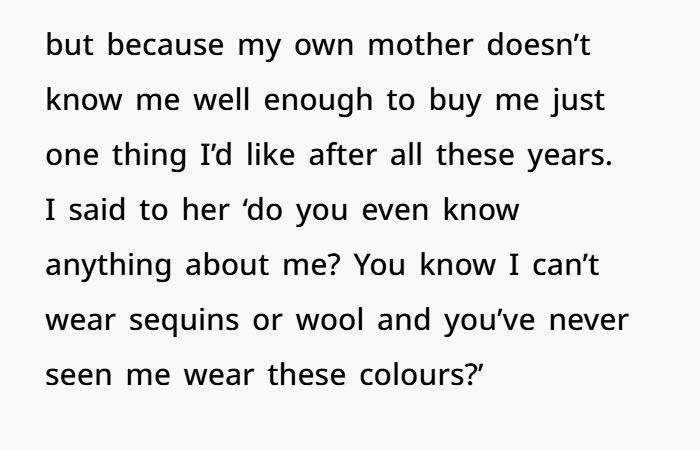
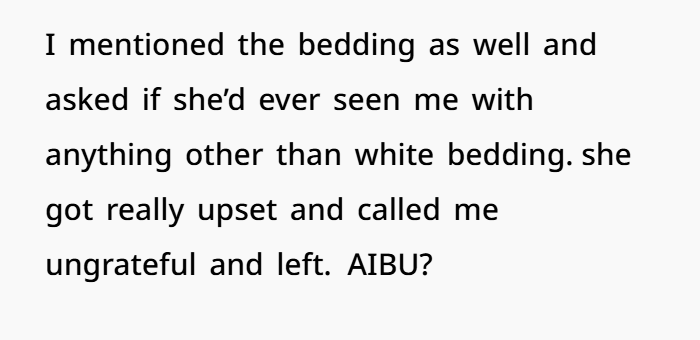
This is the kind of story that digs into deeper things than just a sweater. It’s about family communication, identity, emotional boundaries, and what love looks like when it’s flawed. So let’s unpack.
1. Gifts as language: when presents don’t speak “you”
Gifts aren’t just stuff. They’re messages. When someone gives you something, they’re saying, “I see you. I heard you. I get your taste.” When the gift consistently doesn’t reflect you, it says something else — consciously or unconsciously.

In OP’s case, the mother knows she doesn’t like wool, she knows OP doesn’t wear bright colors or sequins, and she knows OP’s style is minimal and neutral. Yet she gives the exact opposite. That dissonance can sting. It suggests a mismatch in perception: the giver sees their own wishes, not the receiver’s life.
So calling out the behavior is, in a way, demanding to be seen. “You don’t know me well enough to buy me clothes that suit me” is painful, because it suggests emotional distance. But it’s also honest.
2. Power dynamics of mother-daughter gift conflict
This isn’t just about clothes. It’s about a dynamic: mother holds a kind of power (she gives, she expects gratitude). The daughter is in the role of recipient — historically dependent in childhood. Even in adulthood, that dynamic lingers.
When OP says, “do you even know me?” she’s pushing back. She’s asserting: I am not just your child you gift to. I have a personhood, preferences, a boundary. That’s bold. And when someone with power (your mother) is challenged, they often push back, feel threatened, or accuse you of ingratitude.
So yes, calling it out may provoke backlash. But sometimes it’s necessary for clarity, honesty, and trying to shift the dynamics to something healthier.
3. Intent vs effect — what matters more?
One question in gift giving arguments: was the mother trying to do something nice (intent)? Or was she knowingly dismissive (intent)? Intent helps, but effect weighs heavily too. Even if mom meant well, the repeated mismatch suggests negligence or inability to see OP as she is.
If she just loves bright colors and assumes everyone else does, that’s a failing in empathy or attunement. If she consciously gives things she knows OP won’t use, that’s more troubling. But either way, the effect—OP feeling unseen, frustrated, invalidated—is real.
4. Expectations and communication in family relationships
One error many people make is assuming gifts = mind reading. The giver assumes you’ll love what they love, or just picks things they like, hoping that’s “enough.” But healthy gift giving is about paying attention to the other’s preferences.
OP might have spoken more clearly before: “Mom, I really prefer neutrals; sequins irritate me; wool rubs me sore. If you want to gift something, clothes with soft cotton or experiences would mean more than colorful frilly stuff.” Perhaps she tried, maybe didn’t. If she hasn’t, this moment can be a turning point in setting clearer family communication.

So OP calling it out could be an invitation: “I want to be understood. I want you to know me.” But that depends on whether mother is willing to listen. If she immediately accuses OP of being ungrateful, that suggests she’s not open.
5. Is OP being too harsh / ungrateful?
Some will argue OP is overreacting. It’s the thought that counts. The mother did buy gifts. Some would say OP should graciously accept them, even if she doesn’t love them, to preserve peace or emotional harmony. That’s a valid perspective.
But we must also weigh OP’s feelings. If ungrateful labels are thrown to shut her up, that’s gaslighting. If she’s held to a standard where any complaint is “ingratitude,” that’s unfair. Gratitude is not unconditional. You can acknowledge someone’s effort but also say the result hurts you or misses you.
Also, rejecting or critiquing gifts doesn’t mean you reject the giver. OP says she loves her mother — that emotional complexity is real. You can have love and frustration.
6. Repeated pattern vs one bad gift
What makes OP’s reaction stronger is the pattern. If it were a one-time odd gift, maybe you shrug it off. But this has always happened. For your entire life, according to OP, mother gifts things that clash with who she is. That repetition accumulates into a grievance.
Patterns carry weight. One bad present is small. A lifetime of irrelevant presents signals deeper neglect or emotional distance.
7. Possible outcomes & risks of speaking up
By speaking up:
- OP might hurt her mother’s feelings. Mother may feel attacked, unloved, judged.
- It could lead to arguments, tears, guilt trips.
- But it could open space for change: mother might start paying attention, asking what OP likes, or adjusting her gift style.
- Or the mother could dig in, blame OP, shut down, or otherwise reject the feedback.

OP must be okay with risk. If mother doesn’t respond positively, OP may feel hurt. So before speaking, OP needs emotional readiness.
8. How OP could frame it more gently (without losing honesty)
If I were giving advice — how to call it out without burning down the relationship:
- Use “I” statements. E.g., “I feel unseen when you choose things I can’t wear.”
- Acknowledge her intentions: “I know you want to gift me something you think is beautiful.”
- State preferences: “I’d love clothes in neutral tones, cotton, minimal style.”
- Offer alternatives: “Instead of clothes, maybe gift me experiences, books, or something small I’ve mentioned liking.”
- Accept that she may need time to adjust.
This is better than “you never know me” in a confrontational way. But OP did go there — understandable given years of frustration.
9. My verdict: NTA, with hope for growth
Yes — NTA (Not the Asshole). OP was not out of line for expressing deep frustration. She has valid emotional reasons. She’s not a monster for asking her mother, “Do you see me?” That’s fair.
But I also don’t think this moment has to be a war. It can be the start of better communication, if both sides are willing. If mother doubles down and refuses to hear, OP can protect boundaries and still maintain what she wants of the relationship.
One more thought: giving grace sometimes helps in long relationships. But grace doesn’t mean ignoring your feelings forever. If she never changes, OP has the right to feel hurt and to scale back gift expectations.
When she posted about this whole situation online, netizens showed her empathy and started sharing their own similar experiences






